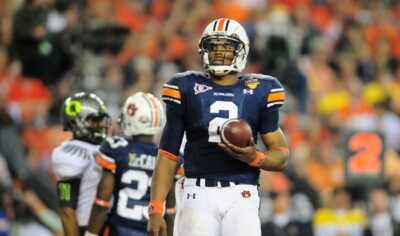
LSU football: Tigers’ home runs were worth more than State’s base hits
By Les East
Published:
LSU had a few long touchdown passes.
And Mississippi State had a whole bunch of short pass completions.
Ultimately, the Tigers’ home runs were more important than all of those base hits by the Bulldogs.
LSU escaped Starkville with an SEC-opening 28-25 victory Saturday afternoon. The Tigers were on the verge of flipping on the cruise control, but they could have been thrust into overtime or even suffered a heartbreaking defeat.
The Tigers averaged 16.5 yards on Max Johnson’s 17 completions, and the Bulldogs averaged 7.9 yards on Will Rogers’ 47.
That was the difference — plain and simple, which is a pretty good description of State coach Mike Leach’s play-calling.
“I was clapping every time they threw the ball short,” LSU head coach Ed Orgeron said afterward.
Orgeron and new defensive coordinator Daronte Jones learned what Orgeron’s former defensive coordinator, Bo Pelini, never did in a 44-34 loss to State in the season opener last year.
Pelini kept playing man-to-man, and LSU defenders kept making mental mistakes in coverage and physical mistakes in trying to tackle pass catchers, who finished with an SEC-record 623 receiving yards.
Orgeron said the Tigers started preparing for the rematch the day after last year’s debacle, mostly rushing 3 and dropping 8 so there would be plenty of tacklers in place to prevent the big plays that burned Pelini’s defense repeatedly.
“We knew they would throw the ball short,” Orgeron said.
Why wouldn’t they? At least until LSU showed that it had wised up, which it did.
The Tigers’ coaches drilled into their defenders that the key to success would not be determined by how many passes State completed, but by how few yards it gained when it did complete passes.
Jones played mostly zone, and his defenders mostly covered what they were supposed to cover and nearly always made a tackle as soon as a pass was caught.
“They told us: ‘Just keep the ball in front of you,’” linebacker Damone Clark said. “No explosive plays. Just keep the ball in front of you.”
The Tigers were banking on the expectation that Rogers couldn’t consistently complete enough passes to sustain long touchdown drives and outscore Johnson and his receivers.
They were right, though things did get dicey at the end.
Nonetheless, LSU never trailed and led for the final 54:04.
When the Tigers had the ball, the dynamic was much different than when State had the ball.
LSU couldn’t run well enough or protect Johnson consistently enough to put together a single drive consisting of double-digit plays.
But it didn’t need to, thanks to Johnson.
And Kayshon Boutte. And Trey Palmer and Kole Taylor.
And an offense that was more successful at creating long passing plays than it was at creating medium-sized gains on running plays.
Johnson threw 4 touchdown passes, and LSU needed all of them. He had touchdowns throw of 64 yards (to Palmer), 58 (to Boutte) and 41 (to Taylor).
“(Offensive coordinator Jake) Peetz just dialed up some great plays,” Johnson said.
The one relatively short touchdown pass was an 11-yarder to Boutte, which completed a mere 35-yard drive after a fumble recovery and return by Clark on the game’s first possession.
The big plays in the passing game made the difference in a game the Tigers’ defense dominated for 3 quarters before it stopped dominating.
“Our defense played their hearts out,” Johnson said.
LSU kept State out of the end zone for the first 44:33 before Rogers finally threw a touchdown pass.
He had 2 more touchdown passes and a toss for a 2-point conversion in a 4:55 stretch late in a fourth quarter in which State ran 24 plays. But Rogers never got the ball back, and LSU held on.
Orgeron said he wished “we would’ve finished better.”
But the sloppy finish didn’t matter a whole lot because the Tigers’ tacklers finished so well on so many of those mini-passes.
Les East is a New Orleans-based football writer who covers LSU for SaturdayDownSouth.com. Follow him on Twitter @Les_East.







